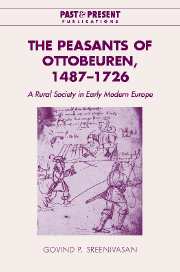Book contents
- Frontmatter
- Contents
- List of figures
- List of maps
- List of tables
- Acknowledgements
- Note on weights, measures, and currencies
- Map 1 Southern Germany, c. 1620
- Map 2 The lands of the monastery of Ottobeuren, 1620
- Introduction
- 1 Right and might (c. 1480–c. 1560)
- 2 The discrete society (c. 1480–c. 1560)
- 3 A crisis of numbers? (c. 1560–c. 1630)
- 4 Integrity and the market (c. 1560–c. 1630)
- 5 Living on borrowed time (c. 1560–c. 1630)
- 6 To empty and to refill (c. 1630–c. 1720)
- Conclusion
- Bibliography
- Index of places
- General index
- Past and Present Publications
2 - The discrete society (c. 1480–c. 1560)
Published online by Cambridge University Press: 21 July 2009
- Frontmatter
- Contents
- List of figures
- List of maps
- List of tables
- Acknowledgements
- Note on weights, measures, and currencies
- Map 1 Southern Germany, c. 1620
- Map 2 The lands of the monastery of Ottobeuren, 1620
- Introduction
- 1 Right and might (c. 1480–c. 1560)
- 2 The discrete society (c. 1480–c. 1560)
- 3 A crisis of numbers? (c. 1560–c. 1630)
- 4 Integrity and the market (c. 1560–c. 1630)
- 5 Living on borrowed time (c. 1560–c. 1630)
- 6 To empty and to refill (c. 1630–c. 1720)
- Conclusion
- Bibliography
- Index of places
- General index
- Past and Present Publications
Summary
Leonhard Hagg of Sontheim was a short-tempered man. Given prevailing peasant notions of honor and personal justice, it might be unfair to call his reactions to life's disappointments those of a bad-tempered man, but a short-tempered man he certainly was. The disappointments themselves were real enough. Leonhard's grandfather had emigrated to Sontheim from Gundelfingen in 1521, acquiring a large Hof and fishing rights in the river that ran through the village. He rose to become one of the richest men in Sontheim, and as village Amman distinguished himself (in the monastery's eyes, at least) by opposing rebellion during the Peasants' War of 1525. With his death in the 1530s, however, decline rapidly set in. It was not so much that the family lost its wealth, but rather that precious little of it – only the fishing rights – came to Leonhard's own family. By Leonhard's boyhood in the mid-1540s, his own father, Johann, had plummeted into the poorer half of Sontheim's households, struggling to pay the rent for the fishwater while Leonhard's grandmother retained both the Hof and her place among the Sontheim oligarchs. Leonhard's father didn't give up, and in 1550 he managed to secure the lucrative lease to the Sontheim inn. Leonhard was able to marry, and by the time of his father's death in 1563, the heir apparent to the inn already had several children. But it was not to be.
- Type
- Chapter
- Information
- The Peasants of Ottobeuren, 1487–1726A Rural Society in Early Modern Europe, pp. 51 - 106Publisher: Cambridge University PressPrint publication year: 2004

